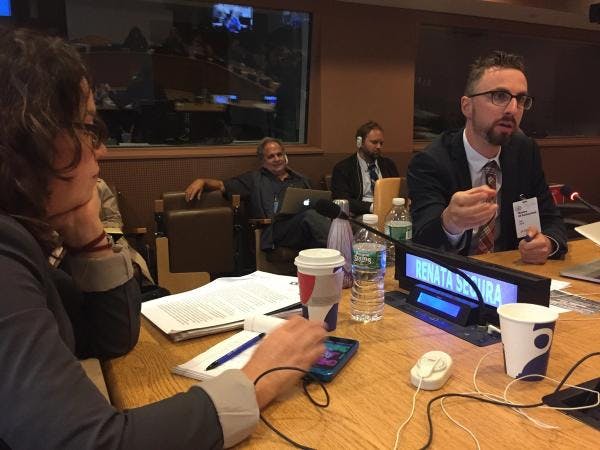Preparing for UNGASS 2016: Examining complex drug policy issues
On October 14, IDPC held an informal briefing for Member States entitled “Preparing for UNGASS 2016: Examining complex drug policy issues” at United Nations Headquarters in New York. The briefing was co-sponsored by the Permanent Mission of Switzerland to the United Nations. In his introductory remarks, H.E. Mr. Ambassador Jürg Lauber, Ambassador Extraordinary and Plenipotentiary Permanent Representative of Switzerland to the UN, welcomed the panel by highlighting the importance of discourse in approaching the unprecedented challenges facing the UN in addressing the world drug problem. He stressed both the importance of purposeful preparation for UNGASS 2016, as well as using UNGASS to implement comprehensive consideration of the challenges Member States with respect to drug policy. He also highlighted the need for drug policies to be based on human rights and public health principles and the importance of considering the full range of linkages between the world drug problem and the Agenda 2030. The Ambassador went on to recognize the importance of engaging both Civil Society and UN agencies to inform the negotiation of the outcome document for UNGASS 2016.
The first speaker was Dr. Renata Segura, the Associate Director of the Conflict Prevention and Peace Forum of the Social Science Research Council. Dr. Segura has overseen dozens of research projects and workshops on challenges to democratic governance and peace in Latin America and the Caribbean, and on topics ranging from drug policy and food security to gender policies in the continent. Taking a critical view of the current approach to UNGASS 2016, Dr. Segura stressed the importance of not minimizing the goal of an effective UNGASS that would include natural and comprehensive discussion on the world drug problem that values systematic coherence. She articulated the difficulty in negotiating the idealistic approach of minimizing the availability of illicit drugs, an approach advocated in the CND, with the views of some Member States and academic civil society, who questioned how realistic the aspiration of a drug-free world is. She challenges UNGASS to examine the impact drug trafficking has on society, and particularly in the capacity to reach the SDGs, while also analyzing the consequences of the current drug control regime.
Professor Jeffrey S. Fagan then joined remotely from Columbia Law School to discuss the proportionality of punishment in the context of drug related offenses. Professor Fagan is an elected Fellow of the American Society of Criminology and is currently working with the UN Office of the High Commissioner for Human Rights on the question of capital punishment for drug traffickers. The Professor focused his presentation on whether or not capital punishment is an effective deterrent to drug use and trafficking, pointing out that 33 member states authorize capital punishment. Citing extensive empirical evidence obtained over a five decade long study, he concluded that the research is clear that the use of the death penalty has no deterrent effect on serious crimes such as murder. In his discussion of proportionality, he illustrated how evidence normally cited to support the “most serious crime” principle (often used to justify capital punishment with respect to drug trafficking) was not only flawed but too ambiguous to support a causal link between trafficking in drugs and the high numbers of drug-related deaths often cited. Further, the data shows (both from the UN and the DEA) that employing the death penalty for trafficking offenses has simply not been effective in reducing the supply of drugs. He concluded that given the finality and the margin of error for the death penalty as well as its lack of deterrent value, its use for drug offenses is not good policy and risks the tragedy of wrongful deaths.
The final presentation was from Dr. Dan Werb, Director at the International Centre for Science in Drug Policy, a Toronto-based research institute working to inform illicit drug policies with the best available scientific evidence. Dr. Werb highlighted the importance of recognizing the inherent limitations of current drug policies in their overall effectiveness related to drug consumption patterns. His comprehensive analysis of the drug policies of several countries suggested that both liberal and stringent approaches produced very similar results in the age of onset and rate of use for cannabis and cocaine. Dr. Werb's case analyses of Vancouver, Switzerland, and Mexico exposed the important policy considerations that must accompany all drug policy approaches. He illustrated the detrimental reliance that any reform has on an equal availability of resources in its implementation. Included in his discussion was an analysis of innovative approaches to drug policy that cohabitate in policy environments hostile to public health-oriented approaches, and the potential in such environments for positive effects from the innovative approaches. Finally, he discussed the need to re-evaluate the current metrics used to evaluate the effectiveness of drug policies, and urged a broadening of metrics to include a range of indicators based on community health, security, human rights, and development.
A thoughtful discussion followed the presentations. The session was moderated by Heather Haase, IDPC’s New York Consultant.
Keep up-to-date with drug policy developments by subscribing to the IDPC Monthly Alert.
Downloads
Topics
Regions
Related Profiles
- New York NGO Committee on Drugs (NYNGOC)
